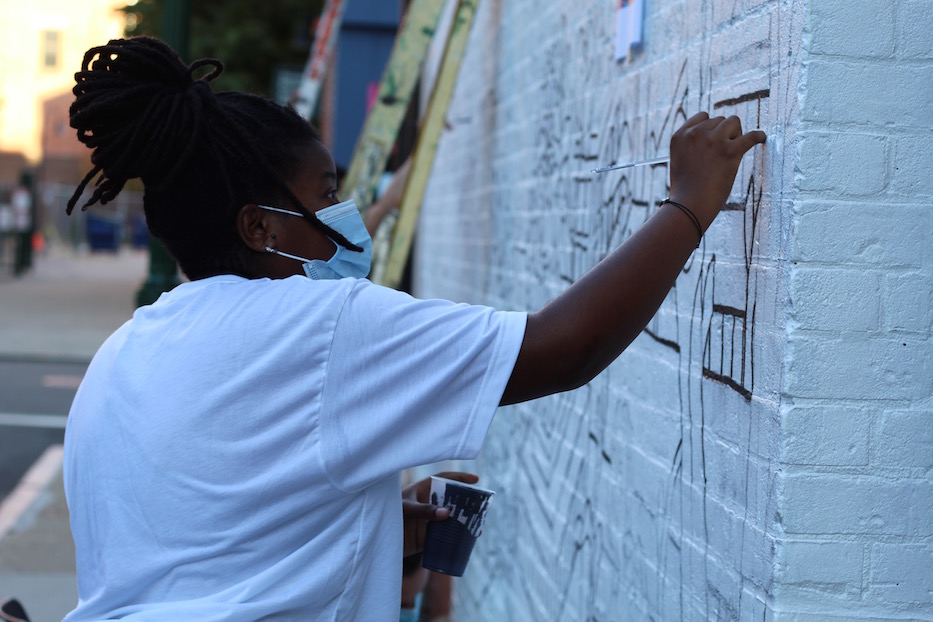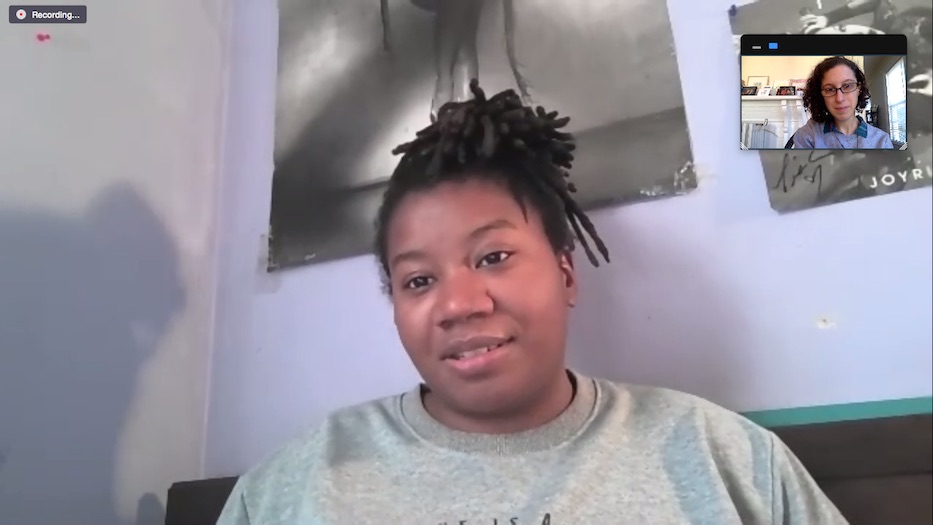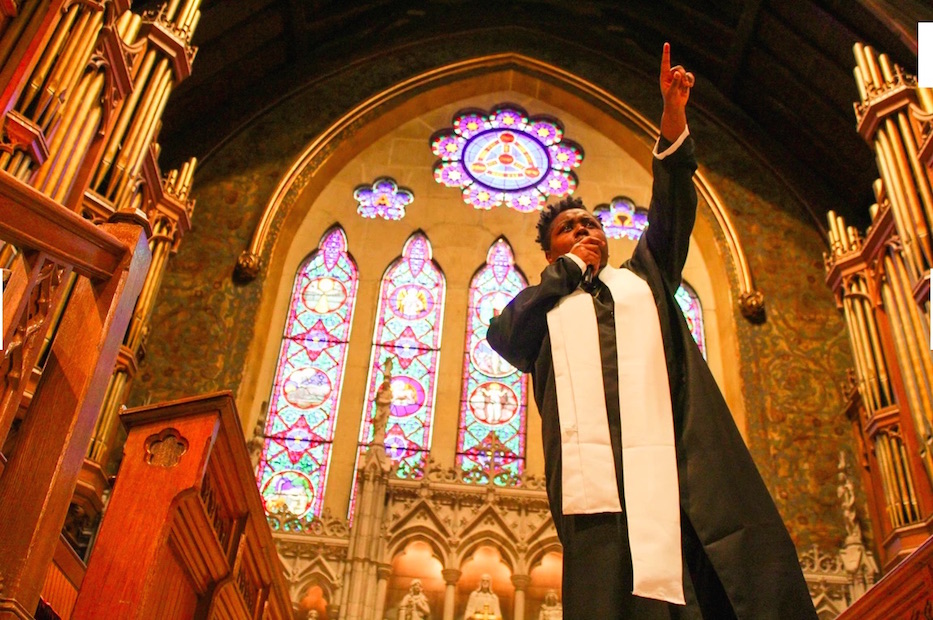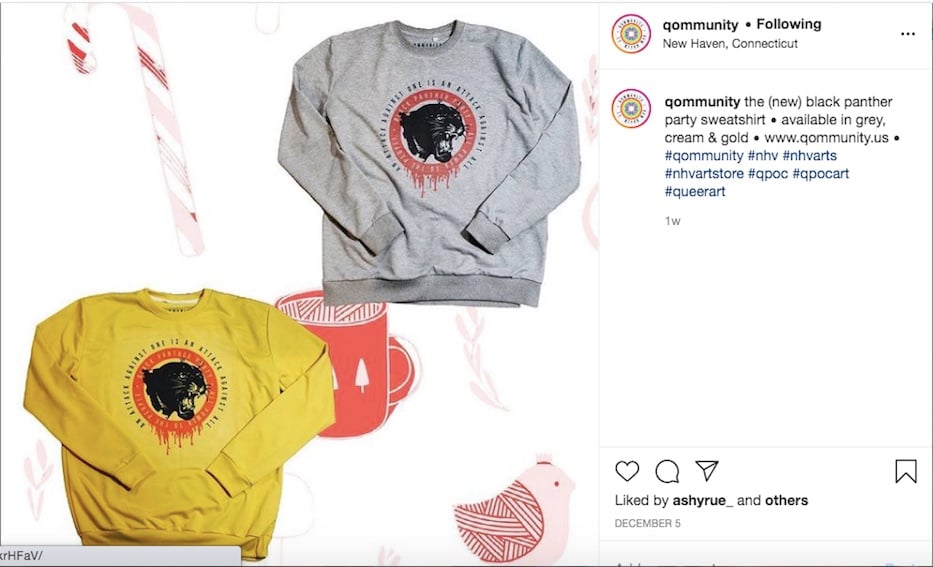
Economic Development | LGBTQ | Photography | Arts & Culture | COVID-19

LaRue painting a mural in the Ninth Square earlier this year. Lucy Gellman File Photo.
Ashley LaRue spent years searching for a platform that could support her—and peers who looked like her—as an artist. When she didn’t find what she was looking for, she began to build it herself.
27-year-old LaRue is the founder and director of Qommunity, a small business dedicated to raising money for healing-centered creative projects through the sale of small, limited-batch clothing and sticker designs. The initiative focuses specifically on healing for queer people and Black people, and those who live at the intersection of both identities.
“This is for Black, queer creatives,” she said in a recent interview on Zoom. “Black and queer people. Of course anybody can wear it because anybody can support, anybody can be an ally. But my community is Black and queer people. And it’s for people who look and believe in the things that I do and want to support that.”
Qommunity is a nod to her work as both an artist and a lifelong New Havener. Born and raised in the city’s Hill neighborhood, LaRue grew up as one of two daughters in a big extended family. Warm nights, long summers, and holidays meant houses full of food and conversation, as her mom and aunts perfected their lobster boils and LaRue learned to grill. Beyond her sister and cousins, she had an extended church family, so tight that she became what she later described as “a poster child” for her house of worship in an essay for the Hartford Courant.
Art was always there, somewhere between school work and family, to catch her. As a student at Helene Grant School (now Wexler-Grant Community School), she designed paintings and set pieces for school theater productions. She “lived in the art room,” even when classes weren’t in session. When she discovered that Hill Career Regional High School didn’t offer art classes her freshman year, she declared an after-school independent study with eight other students. Through the independent study, she learned about Artspace New Haven.

In some ways, that became the earliest groundwork for Qommunity. As a student in Artspace’s summer apprenticeship program, she was one of only three Black teenagers among a sea of white kids from the Connecticut Shoreline and the city’s magnet schools. She looked around, amazed that her friends from Cooperative Arts & Humanities High School weren’t part of the program. She called it the first time she truly saw how segregated the arts—and arts funding—were in the city.
During those years, LaRue also felt a pull away from the arts. She pursued the high school’s finance track and considered a career in marketing. In college, she jumped into business courses at the University of Connecticut (UConn). Then she realized that the field wasn’t the right fit for her at all.
“I am just very passionate about people,” she said. “I like to kind of figure out how people work, if that makes sense.”
She changed her major to human development and family studies, with the goal of becoming a guidance counselor. Around the same time, she joined UConn’s fledging slam poetry team, then called “Poetic Release.” She joined an a cappella group with her friends. She started painting and selling her artwork. Her plan, she said, was to put that work on the back burner while she went to graduate school.
That wasn’t what happened. After “an unfortunate series of events” caused her to pause her graduate studies at Fairfield University, LaRue fell into a spiral of depression. She found herself taking iPhone photos—first a few, and then dozens upon dozens of them—in an attempt to claw her way out of it. On Christmas three years ago, her partner gifted her a camera.
She readjusted her focus. Something clicked.

The artist Mooncha, who was part of The Courageous Project. Ashley LaRue Photo.
“I was just trying to find a way to get out of the funk that I was in, because I was so depressed,” she said. “When you’re depressed, you lose the motivation to do things that once were fun. So I just felt like I couldn't draw. I couldn't paint. I couldn’t write. I just felt like, I need to do something that’s creative that’s different from all the things that I’ve done before. Just to shake myself out of whatever that was.”
In the spring of 2018, LaRue started taking portraits of friends. A few portraits became a year of portraits, and then a project on LGBTQ+ artists, activists, and organizers that she published in the Hartford Courant in summer 2019. In the series, which she later titled The Courageous Project, she photographed subjects in houses of worship, backyards, parks, and beaches. They appeared in long robes and various states of undress; with head wraps and natural hair and skin that glowed in the sunlight. She wrote an essay about her own experience as a queer Black artist, in which she chronicled a split with the Christian church and journey back to God.
The project healed her, she said. She also pinpoints that moment as the official beginning of Qommunity.
The business also took off as a matter of necessity. At the end of 2019, LaRue lost her job. While she was searching for work, she started selling packs of stickers on which her original designs were printed. Friends pitched in. Then friends of friends. Then people she didn’t know. It allowed her to financially tread water—and think about what other designs she was interested in drawing and selling.

Instagram.
Her designs are full of quirk, and sometimes full of history too. There is a brain-shaped Magic 8 Ball, with wet grey folds on its curving sides where a slick black surface would normally be. On one pair of socks, large blue and green ferns stretch against off-white polyester. On another, a pincushion has come to life, and bears its sharp white teeth against punk buttons and dainty red pinheads.
This year, she experimented with the iconic image of a black panther, its mouth open wide and surrounded by the words “An attack against one/Is an attack against all!/Black Panther Party/All power to the people,” in a reference to a late 1960s poster from the Robert Brown Elliott League.
Her most recent designs were inspired by New Haven’s summer of protests, paired with the 50th anniversary of the Black Panther trials in New Haven. When she’s creating, she thinks of artistic and political heroes including Shirley Chisholm and Angela Davis. LaRue said she often returns to the image of Davis speaking at Madison Square Garden in 1972, surrounded on all four sides by bulletproof glass.
“Being out in that and feeling that kind of energy, and knowing the history that New Haven has with Black Panthers,” she said. “You know, you see a Trump supporter somewhere and they have their gear. They have their MAGA [gear], they have their different flags. You know one when you see one. And I just felt like, I want to have something that is branded for me. I want to be able to be like, this is my gear.”
“The Panthers did that, back then,” she continued. “When you saw them, you saw them. So it’s just an homage to that. And I still resonate with the message ‘All power to the people.’ It is what it is.”
A year in, she said she sees the project as the kind of creative space that often isn’t supported by New Haven’s philanthropic community and Economic Development Administration. When there is money and professional development training—through Collab’s small business incubator or small state grants, for instance—there never seems to be enough to go around.
“That’s what I want Qommunity to end up being,” she said. “Its own resource. I think if we had that, we would see a lot more artists in the community. That’s what it is. People need resources. People need money. ”
As she builds the business, she wants to partner with fellow Black, queer artists, city residents of color and young creatives from New Haven to create a circle of financial support. Future projects include a 12-vignette photo series on mental health in communities of color. It is tentatively titled Mend, as shorthand for the phrase “mind your mental health.” She already has collaborators in mind.
“I have of close family friends who were lost to suicide, and it was born out of wanting to understand what it is about who you are that kind of kept you from letting people in to know that these things are going on,” she said. “It was originally called Delusion, because we delude ourselves into thinking that we don’t need help with our mental health when we really do.”
In order to fund Mend—and projects that may follow it—she still needs to make money. She’s starting small: everything is currently made to order, with options for custom printing for clients who are interested. As a photographer, she runs the business alongside freelance work, from New Haven’s first Black art fair in August to protests over the carceral state from the Katal Center for Equity, Health, and Justice.
“I’m excited to have the dream of Qommunity,” she said. “I am. It’s keeping me going at this point. It really is. And all of the Qommunity projects are not just for me. The ideas that I have are definitely inspired by my life experiences, but they’re not just for me. A healing project is only a healing project if you’re doing something for the greater good. If you’re not, what is the real point?”
Visit Qommunity on Instagram or at its website. Visit Ashley LaRue’s website here.

